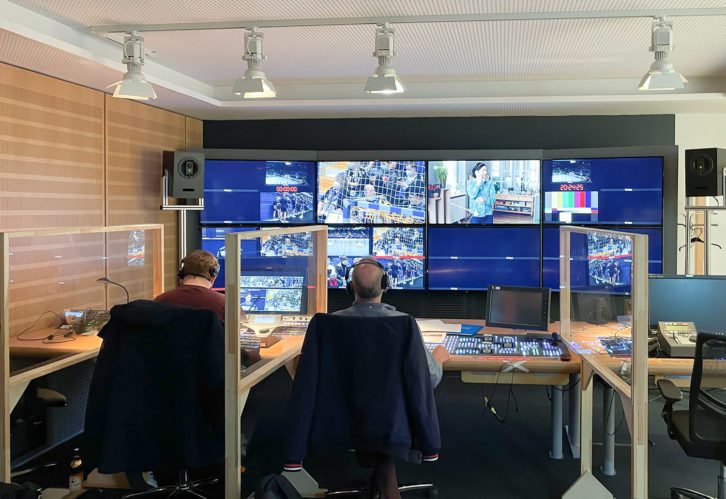 For signal transmission, Studio Berlin uses the network infrastructure of the service provider MTI.
For signal transmission, Studio Berlin uses the network infrastructure of the service provider MTI.
Since the 2020/2021 season, production service provider and studio operator Studio Berlin has been responsible for producing all matches of the Handball EHF European League in Germany on behalf of Infront Productions and creating the world feed. Since February 2022, Studio Berlin has been using a self-developed remote production concept for the men’s EHF European League matches, using only cameras and [atmospheric] microphones in the venues. The actual production, including editing, control, integration of graphics and slo-mo, and the sound mix, is realised with a fixed control room at the Berlin Adlershof facilities.
After successful and intensive tests, the Berlin production service provider Studio Berlin and Infront Productions have decided to implement Studio Berlin’s new remote production concept for handball games covered by four cameras. This concept will also be used for games with up to eight cameras in the future.
The production format for the games is HD 1080i/50, stereo. Only the camera and audio signals are created on-site in the venues. Studio Berlin uses the infrastructure of network provider MTI to transmit the signals to the control room in Berlin Adlershof, running through a bidirectional connection with a maximum bandwidth of 100 Mbps. Riedel Bolero is used for communication between the control room and the venue. For signal contribution, Studio Berlin uses the SRT protocol. Signal distribution continues to take place via satellite. However, the SNG is no longer located at the venue but on the Studio Berlin premises at Berlin Adlershof.
“With this workflow, which we developed especially for this production, we have taken a first, obvious step in introducing remote production services at Studio Berlin. Remote production has been a topic for producers and service providers for a long time, but it has not yet been implemented consistently and ready to go into mass production for these types of sports,” explains Nick Zimmermann, managing director Studio Berlin. “Deploying this concept, Studio Berlin demonstrates its feasibility under the demands of an actual live sports production. The concept handles the available resources sparingly, without accepting a reduction in the usual production quality. For the Studio Berlin team and directors and camera operators, this resulted in a learning process, with working methods and processes being rethought and adapted. Together, we developed a workflow that functions and is a true alternative to using an OB van in many production formats.”
The remote production concept has an additional effect. Remote production and the resulting reduction in production efforts for technology, personnel, travel, hotel, energy and transport (all the venue equipment fits into a Sprinter plus trailer) allow Studio Berlin to realise another important goal that the company has set for itself. Condensed under the term ‘green production’, Studio Berlin consistently strives to significantly reduce its CO2 footprint in its productions. Thanks to the new concept, CO2 emissions from handball production have been reduced by two-thirds.
For the handball remote production, Studio Berlin uses the existing studio infrastructure in Berlin Adlershof. However, because of the positive experiences, the seamless realisation of the handball matches, the demand by the clients and the potential in terms of CO2 reduction, Studio Berlin is considering implementing an explicit remote production control facility in Berlin. Infront Productions is also convinced of the remote production’s positive results deployed at the handball matches. Together, both companies consider an expansion of remote productions based on this concept for other competitions.


 For signal transmission, Studio Berlin uses the network infrastructure of the service provider MTI.
For signal transmission, Studio Berlin uses the network infrastructure of the service provider MTI.






